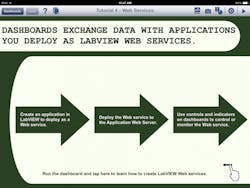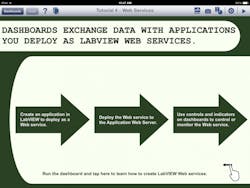TechShop recently threw a party at its San Francisco facility to celebrate a relationship with National Instruments. NI has developed a package of instruments and software expressly for product development and learning at TechShop. The hardware stays at TechShop on multiple benches. TechShop members can walk in with nothing more complicated than an iPad (or a Mac or Windows machine) and access (wirelessly or with cables) the functionality of an oscilloscope, logic analyzer, arbitrary waveform generator, and multimeter using an app called Data Dashboard for LabVIEW (see the figure).
This file type includes high resolution graphics and schematics when applicable.
This is important news because it relates to the whole “Maker” phenomenon. I have attended Maker Faires in the San Francisco Bay area and have been amazed at the enthusiasm of participants. But there’s been a gap between the fairly basic kits for sale and the tents full of people learning to solder and the magnificent steam-punk vehicles and Tesla-coil ballet extravaganzas. The only organizations catering to advanced analog or mixed-signal hackers have been Hacker Dojo and the amateur radio societies.
To my knowledge, the only organization providing access to advanced mechanical fabrication tools has been TechShop, with its mills, lathes, brakes, shears, plasma cutters, and educational programs. TechShop is a chain of member-based workshops. There are facilities in San Jose, Carlos, and San Francisco in California, as well as in Arlington, Va., Pittsburgh, Pa., Allen Park (near Detroit), Mich., and Chandler, Ariz. TechShops in New York City and Los Angeles are in the planning stage.
Membership isn’t cheap. Pay-as-you-go is discouraged by a charge of $175 a month. That goes down to $125 with automatic monthly billing, or what amounts to $116.25 if you pay for a whole year all at once. You can add a family member for what starts at $50 per month. (Or you can win a year’s membership at a hackathon, as my daughter did, and give it to your mother.) So what if you’re into software and don’t have any desire to get near a plasma cutter? (That’s why my computer-scientist daughter gave her TechShop prize membership to her EE mother.)
There are many special interest groups (SIGs) where coders meet in person—giving rise to hackathons, which may take place at corporate facilities. (Google and Microsoft both do that in the Bay Area.) But in the Maker spirit, Hacker Dojo has a really nice facility in Mountain View, Calif. The denizens of the Dojo characterize it as part coworking space, part events venue, and part community center. It doesn’t cost anything do drop in during the normal hours of 8 a.m. to 10 p.m. But for $120 a month, you can have 24/7 access and the ability to host events, like, say, a hackathon—or anything else. I went to a birthday party there once and spent an evening talking to people about the traditions of the Argentine tango.
Finally, on the Maker theme, let’s not forget the oldest Makers, the ham radio community. Fascinatingly, there’s quite a synergy these days between hams and the Arduino community. My buddy Leigh Klotz, WA5ZNU, has written Ham Radio for Arduino and PICAXE, published by the American Radio Relay League, which is probably the oldest Maker organization on the planet.
About the Author
Don Tuite Blog
Don Tuite covers Analog and Power issues for Electronic Design’s magazine and website. He has a BSEE and an M.S in Technical Communication, and has worked for companies in aerospace, broadcasting, test equipment, semiconductors, publishing, and media relations, focusing on developing insights that link technology, business, and communications. Don is also a ham radio operator (NR7X), private pilot, and motorcycle rider, and he’s not half bad on the 5-string banjo.


